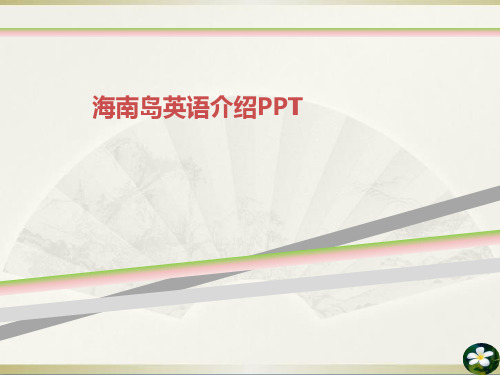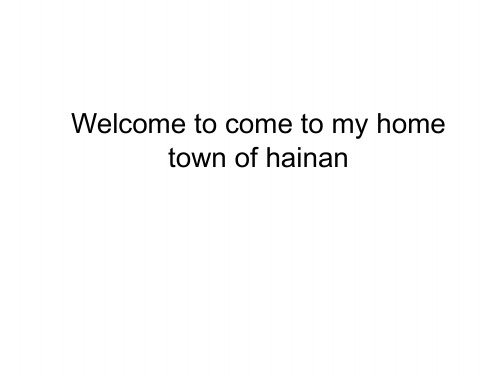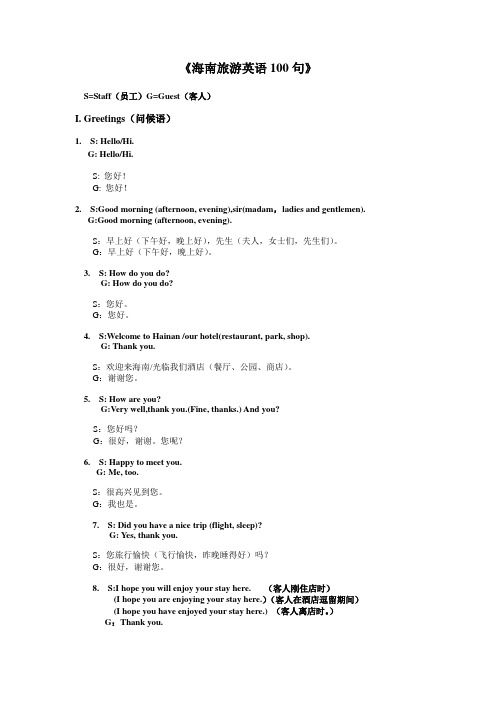海南旅游英语100句课件
海南旅游英语100句

海南旅游英语100句1. Welcome to Hainan!欢迎您来海南!2. Haikouis the capital city of HainanProvinc e.海口是海南省的省会城市。
3. Sanya lies in the south of Hainan.三亚位于海南的南面。
4. Wenchan g is well known as “the home of coconut s”.文昌以椰子之乡闻名于世。
5. Wenchan g Chicken is delicio us.文昌鸡很美味。
6. If you visit Qiongha i, pleasedon't forgetto taste Jiaji Duck.如果你来琼海,请别忘记尝一尝嘉积鸭。
7. On weekend s, you can fly a kite in the Ever Green Park.周末你可以去万绿园放风筝。
8. Holiday Beach is about twentykilomet ers away from the city proper.假日海滩离市区大约二十公里。
9. Is it the first time you came to Sanya?你是第一次来三亚吗?10. I have been in Hainanfor about two weeks.我在海南已有两个星期了。
11. Great changes have taken place in Sanya since 1987.一九八七年以来,海南发生了巨大的变化。
12. How long does it take to go to Sanya from Haikouby bus?从海口坐公车去三亚要多长时间?13. It usually takes about three hours.通常要三个小时左右的时间。
海南岛英语介绍PPT

Hele
Crab
茶早 式 粤
breakfast~早餐篇
海 南 粉
抱罗粉 蟹 粥
尖堆
Food and Dishes 饭食和菜品
椰 子 饭 竹 筒 饭
糟粕醋 椰 子 鸡
seafood海鲜
sweetmeats甜品
鸡 屎 藤
清补凉 BUA~
椰奶冻
Although Hainan belong to north of China,still Hainan people love to eat some piquancy foods. 虽然海南在中国的南方,但是海南人也喜欢吃辣。
海南有着温暖的阳光,湛蓝的大海以及金色的沙滩 .比如天 涯海角,亚龙湾、香水湾
海南岛不仅有海还有山
Hainan island is not only the sea and mountain
Hainan is rich in tropical fruit place,Coconut, mango, pineapple, jackfruit, papaya, sapodilla, rambutan, Annona squamosa, eggs fruit, sugar cane and so on
海南岛英语介绍PPT
Today,Hainan is a famous tourist destination, it has comfortable climate、fresh air、abundant tourism resources、fresh tropical fruits and a lot of delicious food,so that more and more people like travlling there
海南旅游英语介绍

Hainan island and the Hawaii in similar latitude, in a 1528 km on the coast in development can become the world's leading tourist mecca tourism resources.When you are in Sanya, don’t forget to try scuba dive(潜水) . It’s really fun!
Jiaji Duck 加 积鸭
Dongshan Mutton 东山羊
Hainan "fouHr efalemouCsra"b 和乐蟹
海南“四大名菜”
Breakfast
tropical fruit
皇帝蕉 Musa AA)
jackfruit 菠萝蜜
leechee 荔枝
coconut 椰子
Wax apple莲雾
mangosteen 山竹
pitaya 火龙果
rambutan 红毛丹
mango 芒 果
The end
remote places
The Kwan-yin on the water covenred with gold wholly and with a height of 108 meters,Statue of Liberty is 93 meters tall, The Kwan-yin is 15 meters taller than Statue of Liberty,so it is the biggest figure in stone in the world. The world largest Buddha statue has been a symbol of peace ,Wisdom and Compassion in China.
英语宣讲我的海南之旅MytriptoHainan专题培训课件

• On July 14th,we went to Jiangbei airport,starting our Hainan journey.2 hours flight time passed,we arrived in Sanya.
We went to the Butterfly Valley,there are many beautiful
butterflies specimens.
• We also went to the Shell Museum,these shells are all sorts of strange and unusual.
• Hainan is rich in tropical fruit,Coconut(椰子), mango(芒果), pineapple(菠 萝), jackfruit(菠萝蜜),
papaya(木瓜), sapodilla(人
心果), rambutan(红毛丹), eggs fruit(鸡蛋果), sugar apple(番荔枝),sugar cane(甘蔗) etc.
When we arrived in Sanya,we were curious about everything,After having a rest in hotel,we walked along the street,many pedlars were selling local goods,like beach pants, coconut carving ,shell carving, crystal,pearl, tea,and seafood products.We bought two skirts,2 coconuts and some souveniers like shell carvings.
海南旅游(英文全)

To introduce the culture and other next hainan。 再为大家介绍下海南的文化以及其他。
Boao Asia forum. 博鳌亚洲论坛会。
57 th miss world held in sanya, sanya added for a beautiful scenery. 第五十七届世界小姐在三亚举行,为三亚增添了一道亮丽的风景。
Is creating international tourism island of hainan is with the most real glamour to the world to say: "hainan welcome you." 正在创建国际旅游岛的海南正在用最真实的魅 力向全世界说一声:“海南欢迎您。”
The ends of the earth is located and the heart of China's most south west 26 kilometers sanya, the scenic area is mainly composed of tropical beach resort and shopping area and granite resort composition, integrated tropical ocean view, historical relics, the Chinese folk culture for the integration of tourism scenic spot.
And, this is my hometown of true love, hope you can like this beautiful place. 这,就是我挚爱的家乡,希望大家也 能喜欢这个美丽的地方。
海南旅游英语100句

《海南旅游英语100句》S=Staff(员工)G=Guest(客人)I. Greetings(问候语)1. S: Hello/Hi.G: Hello/Hi.S: 您好!G: 您好!2.S:Good morning (afternoon, evening),sir(madam,ladies and gentlemen).G:Good morning (afternoon, evening).S:早上好(下午好,晚上好),先生(夫人,女士们,先生们)。
G:早上好(下午好,晚上好)。
3. S: How do you do?G: How do you do?S:您好。
G:您好。
4. S:W elcome to Hainan /our hotel(restaurant, park, shop).G: Thank you.S:欢迎来海南/光临我们酒店(餐厅、公园、商店)。
G:谢谢您。
5. S: How are you?G:Very well,thank you.(Fine, thanks.) And you?S:您好吗?G:很好,谢谢。
您呢?6. S: Happy to meet you.G: Me, too.S:很高兴见到您。
G:我也是。
7. S: Did you have a nice trip (flight, sleep)?G: Y es, thank you.S:您旅行愉快(飞行愉快,昨晚睡得好)吗?G:很好,谢谢您。
8.S:I hope you will enjoy your stay here. (客人刚住店时)(I hope you are enjoying your stay here.)(客人在酒店逗留期间)(I hope you have enjoyed your stay here.) (客人离店时。
)G:Thank you.S:希望您在我们酒店过得愉快。
G:谢谢您。
9. S: Nice to see you again.G: Nice to see you, too.S:真高兴再次见到您。
英文介绍旅游景点之海南岛 PPT
古迹名胜:具有历史意义的古迹主要有:为纪念唐宋两代被贬谪来海南岛的李德裕 等5位历史名臣而修建的五公祠、 北宋大文豪苏东坡居琼遗址----东坡书院以及为纪念苏东坡而修建的苏公祠、 为巡雷琼兵备道焦映汉所修建的琼台书院、 丘浚(明代名臣)之墓、海瑞(明代大清官)之墓 ,汉武帝派遗率兵入海南的伏波将军为拯救兵马而下令开凿的汉马伏波井, 还有崖州古城、韦氏祠堂、文昌阁等等。 革命纪念地有琼崖纵队司令部旧址、嘉积镇红色娘子军纪念塑像、 金牛岭烈士陵园、白沙起义纪念馆、宋氏祖居及宋庆龄陈列馆等。
• 海南的山岳最具有特色的是密布着热带原始森林
鹦歌岭
五指山
东山岭
太平山
东山岭
大家应该也有点累了,稍作休息
大家有疑问的,可以询问和交流
its natural beauty has gained a good reputation(名声) among the visitors and has been widely known around the world. People call it "the Oriental Hawaii".
• 海南岛为中国一个省级行政区——海南省 的主岛。海南省简称琼,位于中国最南端。 北以琼州海峡与广东划界,西临北部湾与 越南民主共和国相对,东北濒南海与台湾 省相望,东南和南边在南海中与菲律宾、 文莱和马来西亚为邻。
1Hainan island is the second largest island of China (after Taiwan). 2The capital of Hainan is Haikou City,while it is also the biggest city on the island.
海南岛英语介绍PPT
Today, Hainan is a famous tourist destination, Haikou and as both endpoints in Sanya, Hainan tours Basic is divided into three lines, along the East Coast, coastal tourism scenic demarcation is a minority view, Li seedlings and the other one is the West coast of the original jungle scenery.Within this total, Sanya is the highlight of Hainan. Is called the Oriental Hawaii
海南岛不仅有海还有山hainanislandmountainyudaibeach玉带滩海南美食猴面包树baobabwanquanriverdrift万泉河漂流xinglongtropicalbotanicalgarden兴隆热带植物园xinglongoverseasfarm兴隆华侨农场旅游区haimenpark海门公园penanggarden槟榔园兴隆三亚crystalexpo水晶博览endsearthsouthernpillar天涯海角南天一柱nanshanbuddhismculturaltourismzone南山佛教文化旅游区beautifulspringhotel美丽春天大酒店coconutdreamcorridor椰榔大道yalongbaycentralsquare亚龙湾中心广场三亚海口wuzhizhouislandshellhouse贝壳馆海边夜景atnighthainanhastropicalclimatechangeablepleasedobringumbrella海南属于热带气候天气多变请您出发时别忘了带雨伞
海南国际旅游岛英语PPT介绍
The last: please be carefully!!! Because:
Thank you!!!
4.fu zhao kun ---tourist A The Sound Station Bus System need be bilingual(双语的)--Chinese and English
5.li dong chen --tourist B The bus nameboard need be bilingual--Chinese and English
4.Bus lines design unreasonable
How to solve these problems? the measures that we should take:
1.liu yi han --Office worker(上 班族) I hope Bus company need to launch(新产品的投 产) IC cards
2.wang zhao hui ----citizen( 市民) we hope the bus routes to the city as much as possible the scope(范围) of coverage (覆盖面)
3.cheng xiao long--taxi driver We should know simple English Communication,it easier for foreigners to take.
6.zhao li li ---tourist C There are many public transportation routes to suburbs attractions,convenient for visitors to tour.
英文版PPT-海南景点、小吃、风俗介绍知识分享
-Yalong bay-
Yalong bay resort is located in China's southernmost tropical seaside tourism city - 28 km southeast of sanya, hainan is the southernmost tip of a half moon bay, about 7.5 km, is the famous scenery of hainan. The beach of yalong bay stretches for 7 kilometers and is smooth and wide. The shallow sea area is 50 to 60 meters wide. The grains of sand were white and soft, and the water was crystal clear and blue. Visibility 7-9 meters. The seabed world resources are rich, there are coral reefs, various tropical fish, precious shellfish and so on. The annual average temperature 25.5 ° C, the water temperature 22 to 25.1 ° C, all the year round can be swimming, was regarded as the first bay "day"
-Nanshan sea guanyin-
The nanshan sea guanyin was founded by the foundation of hainan's nanshan sea guanyin foundation. It is one of the most magnificent and magnificent, and it is the most beautiful in the world. Due to its great scale, great significance, and rich buddhist understanding, the project is known as the "world class and century" buddhist project. The head of the Chinese buddhist association, zhao park, is entitled "nanshan sea guanyin". The 108meter sea guanyin is 15 meters higher than the statue of liberty. It is the world's largest guanyin, and is the largest in the world. It is forged for stainless steel.
- 1、下载文档前请自行甄别文档内容的完整性,平台不提供额外的编辑、内容补充、找答案等附加服务。
- 2、"仅部分预览"的文档,不可在线预览部分如存在完整性等问题,可反馈申请退款(可完整预览的文档不适用该条件!)。
- 3、如文档侵犯您的权益,请联系客服反馈,我们会尽快为您处理(人工客服工作时间:9:00-18:30)。
饭店英语培训资料Hotel English V ocabulary 酒店英语词汇front office department前厅部food and beverage department 餐饮部housekeeping department房务部recreation &entertainment department康乐部security department保安部human resources department 人力资源部executive office行政办sales and public relations department销售部engineering department 工程部accounting department 财务部crib 婴儿床stroller婴儿车broad band宽带iron 熨斗ironing- board烫板umbrella雨伞calling card电话卡transformer变压器adapter多头电源插座mobile charger 手机充电器envelope信封automatic- teller machine (ATM)自动取款机stamp邮票package包裹suitcase/luggage行李airport机场diaper尿布toilet paper卫生纸copy machine复印机fax machine传真机overhead projector投影仪taxi出租车Matches火柴post card明信片razor剃须刀shampoo洗发水soap香皂toothpaste牙膏toothbrush牙刷blanket毛毯bath towel浴巾battery电池film胶卷glue胶水staple订书机hanger衣架laundry bag洗衣袋laundry list洗衣单wardrobe衣柜slipper拖鞋umbrella雨伞carpet地毯air conditioner空调computer电脑elevator/lift电梯refrigerator冰箱remote control遥控器front desk 前台business center商务中心room reservation客房预定room service 送餐wake up/morning call 叫醒shift time 交接班时间extra bed加床conference会议swimming pool游泳池Bowling center保龄中心night club夜总会game center棋艺中心sauna and massage center 桑拿中心hair and beauty salon美容美发Available 可提供的baggage receipt/tag 行李卡cancellation取消check-in入住check-out退房complaint投诉confirm确认daily rate日租departure离期discount折扣extension分机flight航班full /half day charge全(半)日租guarantee 保证guide导游handling charge手续费handicapped残疾的extra fee杂费message留言payment付款方式deposit押金passport护照pay in advance预付款pick-up service接送服务postage 邮资registered mail挂号信registration card登记单room rate房价safe box保险箱service charge服务费to fill in/out填写,填好sign bill is not accepted不能签单hotel tariff 酒店房价表balance余额credit card 信用卡exchange rate兑换率traveler’s check 旅行支票Standard room标准间suite套房词类一、数词的分类1. 基数词表示数目的词称为基数词。
其形式如下:A.从1——10:one,two,three,four,five,six,seven,eight,nine,ten.B.从11——19:eleven,twelve,thirteen,fourteen,fifteen,sixteen,seventeen,eighteen,nineteen.C.从21——99整数几十中除twenty,thirty, forty,fifty,eighty为特殊形式外,sixty,seventy,ninety都是其个位数形式后添加后缀-ty构成。
表示几十几时,在几十和个位基数词形式之间添加连字符“-”:21 twenty-one 76 seventy-sixD.百位数:个数基数词形式加“hundred”,表示几百,在几十几与百位间加上and.101 a hundred and one320 three hundred and twenty648 six hundred and forty-eight E.千位数以上从数字的右端向左端数起,每三位数加一个逗号“,”。
从右开始,第一个“,”前的数字后添加thousand,第二个“,”前面的数字后添加million,第三个“,”前的数字后添加billion。
然后一节一节分别表示,两个逗号之间最大的数为百位数形式。
2,648 two thousand six hundred and forty-eight16,250,064 sixteen million two hundred and fifty thousand sixty-four5,237,166,234 five billion,two hundred and thirty-seven million,one hundred and sixty-six thousand,two hundred and thirty-four2. 序数词表示顺序的词称为序数词。
序数词的主要形式:A.从第一至第十九:one—first,two—second,three—third,five—fifth,eight—eighth,nine—ninth,twelve—twelfth为特殊形式,其它的序数词都是由其相对应的基数词后面添加“th”构成。
例如:six— sixth、nineteen— nineteenth.B.从第二十至第九十九:整数第几十的形式由其对应的基数词改变结尾字母y为i,再加“eth”构成。
twenty——twentieth thirty——thirtieth表示第几十几时,用几十的基数词形式加上连字符“-”和个位序数词形式一起表示。
thirty-first 第三十一fifty-sixth 第五十六seventy-third 第七十三ninety-ninth 第九十九C.第一百以上的多位序数词:由基数词的形式变结尾部分为序数词形式来表示。
one hundred and twenty-first 第一百二十一one thousand,three hundred and twentieth 第一千三百二十D.序数词的缩写形式first——lst second——2nd third——3rd fourth——4th sixth——6th twentieth——20th twenty-third——23rd其中lst,2nd,3rd为特殊形式,其它的都是阿拉伯数字后加上th。
二、时刻表示法1. 表示几点钟用基数词加可以省略的o\'clock5:00 读作five o\'clock 或five2. 表示几点过几分,在分钟后加past,再加小时five past seven 七点过五分half past six 六点半 a quarter past eight 八点过一刻3. 表示几点差几分,在分钟后面加to,再加小时ten to eight 差十分八点(七点五十分)a quarter to twelve 差一刻十二点(十一点四十五分)在日常生活中,常用下列简单方法表示时间。
6:31读作six thirty-one10:26读作ten twenty-six23:55 读作twenty-three fifty-five 注:时刻表上的时间大多采用24小时表示法,这样就不需要用a.m.表示上午,p.m.表示下午了.三、年月表示法A.年份用基数词表示,一般写为阿拉伯数字,读时可以以hundred为单位,也可以以世纪、年代为单位分别来读。
1949 读作nineteen hundred and forty-nine 或nineteen forty-nine1800 读作eighteen hundred1902 读作nineteen hundred and two或nineteen o twoB. 月份,为了简便起见,月份与日期连用时,月份常用缩写形式表示。
缩写形式除May,June,July外,其它的月份都由其前三个字母表示,但September除外。
January——Jan.一月February——Feb.二月March——Mar. 三月April——Apr.四月May五月.June 六月.July七月.August——Aug.八月September——Sept.九月October——Oct.十月November——Nov.十一月December——Dec.十二月注:这里缩写形式后面加点不能省略,因为它是表示缩写形式的符号。
四、加减乘除表示法1. “加”用plus,and或add表示;“等于”用is,make,equal等词表示。
2+3=? 可表示为:How much is two plus three?二加三等于五:Two plus three is five.Two and three is equal to five.Two and three make five.Two added to three equals five.2. “减”用minus或take from表示10-6=?How much is ten minus six?十减去六等于四Ten minus six is four.Six (taken) from ten is four.3. “乘”用time(动词)或multiply表示3X4=? How much is three times four?三乘以四等于十二Three times four is/are twelve.4. “除”用divide的过去分词形式表示16÷4=? How much is sixteen divided by four?十六除以四等于四Sixteen divided by four is four.五、分数表示法1. 分数是由基数词和序数词一起来表示的。
